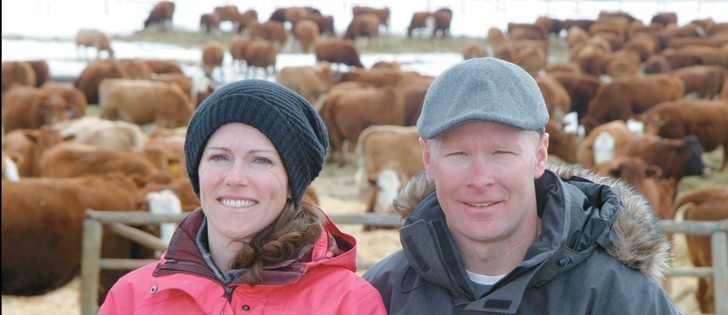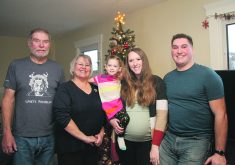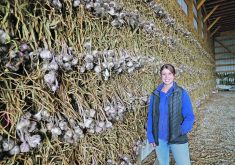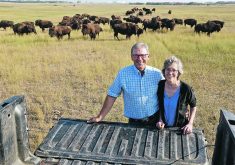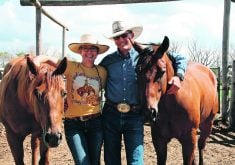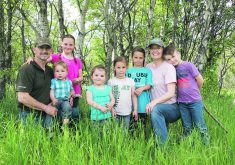BIRTLE, Man. — Dorelle and Tyler Fulton are urban professionals who live nowhere near a city.
Their jobs are based in Winnipeg and Calgary, but they both live and work on a family cattle operation just east of the Saskatchewan border in beautiful parkland south of Riding Mountain National Park.
The park and family history plucked them from a chic downtown Winnipeg loft apartment with 23 foot high ceilings and placed them beside the family herd of commercial cattle.
They couldn’t be happier.
“We thought that it might work for a year, but here we are seven years into it,” said Dorelle, marvelling at how well farm and professional life have meshed due to the miracles of the internet and progressive employers.
Read Also

Nutritious pork packed with vitamins, essential minerals
Recipes for pork
Dorelle is an accountant and financial manager who now works for Parks Canada. Tyler is the director of risk management for Hams Marketing, which markets hogs for farmers in Manitoba and Saskatchewan.
Both perform their professional jobs via phone and computer, something that was not possible 10 or 15 years ago in distant rural locations like this.
They moved to the farm because Dorelle was able to find an accountancy job with Parks Canada in the national park. Tyler was able to move his job with Hams from the office in Winnipeg to Birtle.
Only a couple of months after applying for the Parks Canada job, Dorelle found out she was pregnant. She was offered the job a month later. She thought her pregnancy might ruin that opportunity because she would soon need to go off on leave.
“They said, ‘no, we still want you,’ ” said Dorelle.
They moved to western Manitoba as soon as she got the job. She worked two months and then was off on maternity leave with twins: a boy and a girl.
After two years off work with Evan and Mae, Dorelle went back to work for Parks Canada two days a week.
Then the Calgary job with Parks Canada came up and she decided to apply.
The Calgary manager in charge of hiring already had one staff member telecommuting from Montreal, so having Dorelle work by computer from rural Manitoba was no big deal to him. She got the job.
Tyler loves his risk management job, having studied agricultural economics at the University of Manitoba and getting student jobs with the Winnipeg Commodity Exchange before arriving at the Manitoba Pork Marketing Co-operative — the precursor to Hams — 15 years ago.
Being able to move the position to Birtle helped him with his goal of getting back to the family farm.
Tyler and Dorelle were experiencing as downtown a life as is possible in Winnipeg, living in the centre of the Exchange District at the top of a heritage building.
However, Tyler wanted to move back home and get involved in the family cattle business. Dorelle is a city girl with few rural connections, but she wanted the farm life too.
“We started spending a lot of weekends out here, and I really enjoyed it,” said Dorelle.
“Wide open spaces, riding a little 50 (all-terrain vehicle) around to check the corn crop, playing with the dogs: I liked it all.”
Moving to Birtle put them into the middle of the family cattle operation, which has grown to 450 calves.
Tyler and Dorelle share the management, resources and revenues for the cattle with Tyler’s parents, al-though all assets are owned separately and revenues are divided according to each family’s contribution to production, both in terms of resources and labour.
The herd produces commercial cattle, with the family doing most of its own backgrounding and selling most of the calves at about 900 pounds.
The animals are pastured and hay-fed from a base of 4,400 acres.
Tyler’s father, David, has exported hay to high-priced U.S. markets for most of the past few decades, shipping small square bales. The business was helped by his master’s degree in animal nutrition.
The export business continued for a few years after Tyler returned to the farm, with about one-third of the farm’s hay crop going to “Florida for racehorse markets, Colorado for the mule train market, Minnesota and Wisconsin dairies.”
Hay exports were lucrative in 2012 as the U.S. Midwest drought devastated supplies and feed prices soared. Tyler found his market analysis skills pushing the farm in the opposite direction from building the cow herd because feed grain prices were rising and feeder cattle prices were softening.
“You wanted to be long on hay and short on cattle,” said Tyler.
Taking advantage of sky-high hay prices was worth reducing the herd, even though the ranch hedged its calves against price declines.
They sold many of their calves earlier than planned to be able to export more hay. However, the feed grain market has since peaked and livestock prices began to soar. As a result, the Fultons have gone the other way, reducing hay sales to almost zero and keeping calves longer.
“We really want to be able to maximize our own production for our own purposes,” said Tyler.
Apart from a handful of small sales to local buyers, the family now keeps all their hay and feeds it to their cattle.
Balancing professional careers and children is stressful for many young couples. For the Fultons, it’s been the opposite, bringing together all the things they love in their lives.
“I love the job I have because I wake up on the farm, I get to see my kids go off to school, then my job starts,” said Dorelle.




